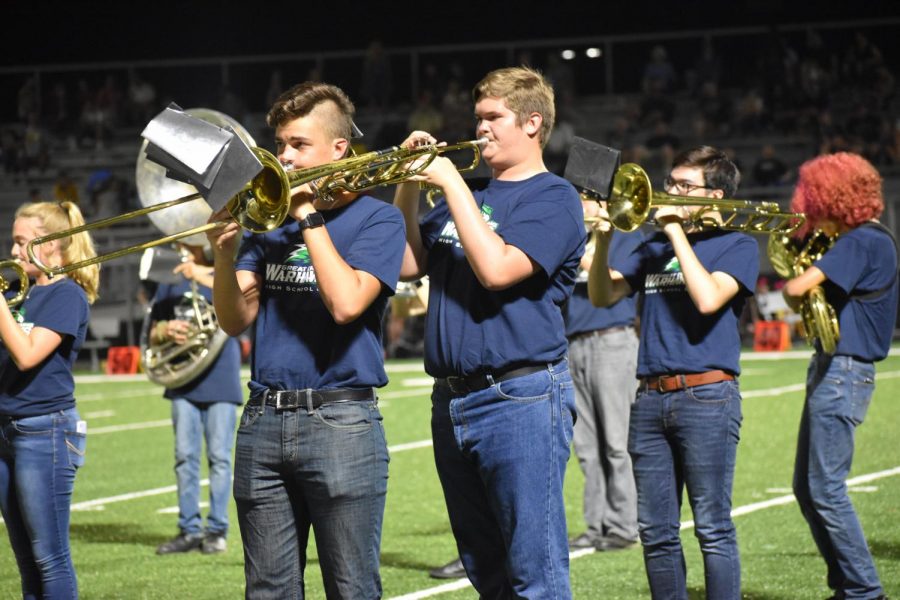It’s a sad but kind of sweet story: a little rural school (282 students, total, K-12) in West Virginia has a small but mighty high school band, enthusiastically supporting the home team on Friday nights. Over the summer the band director leaves the district. First day of school, the principal shows up in the band room, offering the 38 band members the option of dropping out and taking another class. Ten of the students, however, decide to stay and teach themselves (with the principal’s permission, noting that he had already set money aside in the budget for a band program).
The rest of the story, in the Washington Post, praises the students for making their own rules, playing the fight song and chants at games, and generally keeping the ball rolling, with two bona fide teachers serving as advisors.
The story dedicates half a sentence– West Virginia is experiencing a certified teacher shortage like many states nationwide—to the real, underlying problem. The headline is particularly annoying: A high school band teacher quit. Now, the students teach, direct themselves.
Imagine a first-grade classroom, with a dozen adorable, willing children. Their teacher quits, in August. So the principal decides that a couple of adult wranglers can manage them, because she’s set aside money for new reading books and computers, and because they all learned their letters in kindergarten. Maybe a new teacher will turn up. In the meantime, they can be kept busy doing what they did last year.
Perhaps you’re thinking that the national shortage of teachers is limited to certain sub-specialties, or geographic regions, that no responsible school leader would leave a group of six-year-olds to “teach themselves.” If so, you ought to take a look at the percentages of students, especially in charter schools, with unqualified substitutes. There are uncertified subs everywhere, in all subjects, k-12, and unfilled jobs in prestigious private and suburban schools, two months after the start of the school year.
The loyal-to-band kids in West Virginia do not surprise me. Band students, in my thoroughly biased opinion, are THE BEST, and these kids appear to be like band kids everywhere—self-starters, and leaders. Good kids. There are, of course, good kids in all grades and disciplines, in every school, those who can be trusted to carry on when the chips are down.
But here’s the thing that doesn’t get mentioned in this feel-good story: the band kids in WV learned how to do the things they have done—writing rules, running rehearsals, playing tunes—from a teacher. By all indications, a pretty good teacher, someone who instilled a spirit of cooperation that led students to try to balance out the band sound by switching instruments.
Once football season is over, who will be moving their music education forward, teaching them the new skills and music they deserve? Who is preparing younger students there, who will become the high school musicians when these amazing kids graduate? There is no building process, no pipeline of activities that lead to cycles of growth. Without a teacher, this program is headed toward a dead end.
It would be like teaching kindergarteners the skill of letter-sound correspondence, then not providing them with books, discussions, stories, rhyming games, tools to make them better readers, developing an appreciation and desire for full adult literacy. All along the way, students need teachers. A good teacher is the launching pad for students’ “teaching themselves.”
Further—the headline suggests that the band teacher who “quit” caused this situation. I have no idea why the previous band teacher left—could be anything from lousy pay and working conditions to a much better school music job with a bigger band and budget. Or a different job, with regular hours and Friday nights at home, instead of the frozen bleachers. You might call this self-care for burned-out teachers.
The principal holds out hope that a band teacher can be found. But the changing labor force, kick-started by a global health emergency, has made many skilled workers, including teachers, re-consider their worth. The pay scale is only one bit of evidence that schools need to treat their teachers like the essential driver of quality public education.
In West Virginia, their flagship university has suffered a 10% drop in enrollment since 2015, revenue lost during the pandemic and an increasing debt load for new building projects. It’s a new world, and early indicators about the availability and use of resources to provide a world-class education for every child— which include actual music teachers—are alarming.


[…] her blog called “Teacher in a Strange Land,” Nancy Flanagan describes the heartwarming story of a high school marching band that carried on after their teacher quit and explains why the story is not heartwarming after […]
LikeLike
[…] her blog called “Teacher in a Strange Land,” Nancy Flanagan describes the heartwarming story of a high school marching band that carried on after their teacher quit and explains why the story is not heartwarming after […]
LikeLike
I agree this is not a heartwarming story. Diane Ravitch posted a similar account from the Houston district that’s been taken over by Mike Miles. (The original post is paywalled.)
These students, like the band kids, can never regain what’s been lost in terms of their instruction. There’s no do-over. Also, every student deserves a certified professional to teach every class.
In Houston, Miles’ goal is undoubtably to get rid of veteran teachers while undermining the system. Texas has a $33 billion budget surplus, so it’s not about the money. I highly doubt there’s money sloshing around in West Virginia. Our kids’ education cannot be on the chopping block.
LikeLike
“Imagine a first-grade classroom, with a dozen adorable, willing children. Their teacher quits, in August. So the principal decides that a couple of adult wranglers can manage them, because she’s set aside money for new reading books and computers, and because they all learned their letters in kindergarten.”
That’s pretty much a high end microschool.
LikeLike